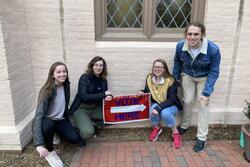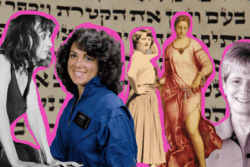The 2020 Election in Ohio: Continuing the Feminist Struggle for and Beyond Representation
Maybe I’m an idealist, but I believe government has the power and responsibility to improve lives. Because of my faith in the government's potential and my commitment to feminism, I think it’s imperative that we elect leaders who will work to create a better world. So this summer, when a friend suggested I join her in applying for an internship with a state legislature campaign for the candidate Mary Lightbody, I immediately sent in my resume. Representative Lightbody’s political stances reflect many of my progressive and feminist values: she supports funding public education, access to healthcare, scientific solutions to the COVID-19 pandemic, and women’s reproductive rights.
Another reason why I was so excited to work on Representative Lightbody’s campaign is that she was running for re-election in my state of Ohio, where women are politically underrepresented. This matters, because when women are in political office, it often results in policy measures that reaffirm women’s human, civil, and reproductive rights.
But Representative Lightbody’s conservative political challenger raised questions for me about the relationship between feminism and women in politics. Representative Lightbody’s opponent was also a woman—Meredith Freedhoff—whose campaign website described her as the “only woman in the boardroom.” She, too, seemed to have shattered glass ceilings, and her election would also mean a female politician in the Ohio government. So, was this a win-win situation? Or, in other words, is women’s access to political power the primary concern of contemporary feminism and the feminism of my foremothers?
I ask this question because feminist activism is my heritage. My great-grandmother was involved in first-wave feminism both as a suffragette challenging political norms and as a flapper challenging social norms. Her daughter, my grandmother, had to give up her dream of being a professional musician because orchestras didn’t accept women at the time. Influenced by second-wave feminism, she instead became a social worker and eventually a tenured professor, and also helped to establish a Planned Parenthood branch in Athens, Ohio.
Two women running as the major party candidates in a political race is something my great-grandmother could only have imagined. The normalcy with which I viewed the two candidates, both of whom had careers and children before seeking office, would have astounded my grandmother in her youth. More and more women, including Lightbody and Freedhoff, are living a reality which previous feminists worked for, a reality which was a goal of my grandmothers’ activism. Yet the outcome of the election still mattered to me and my understanding of feminism.
As a self-described feminist, I don’t believe in judging whether someone is a feminist based on their individual choices regarding work, religion, children, abortion, or any of the many other choices a woman makes for herself in her lifetime. To me, feminism is about having these choices and being able to determine one’s own path. However, when women gain access to power and use their power to deny rights to other women—especially women less privileged because of race, sexual orientation, gender identity, ability, or socioeconomic status—that’s not feminism.
Meredith Freedhoff believes that Planned Parenthood should receive no government funding and most abortions should be outlawed. Meanwhile, Representative Lightbody opposes legislation that she says “will deny women dominion over their own bodies and will deny them access to quality healthcare.” Unsurprisingly, Lightbody received Planned Parenthood’s endorsement.
My grandmother and her contemporaries fought so ardently for reproductive justice because they understood how essential these rights are for gender equality. Second-wave feminists also recognized the consequences of unplanned pregnancy on women’s financial stability and independence—many even risked their lives to get back-alley abortions rather than give up these freedoms. And today’s fourth-wave intersectional feminists are raising awareness about the inherent racism of abortion restrictions. Electing a candidate who advocates for reproductive rights for all is just as essential as ensuring women are represented in government.
Ironically, this idea that women in power equals feminism—no matter the policies said woman stands for—has been recently espoused by conservatives as a reason to support Amy Coney Barrett’s confirmation to the Supreme Court. Like Meredith Freedhoff, Barrett is a working mom who has broken traditional norms in her career. Also like Freedhoff, Barrett is wholeheartedly committed to stripping reproductive rights from women and anyone else who can get pregnant. Barrett will use her power to limit women’s rights, and by doing so, she will act in opposition to feminism, regardless of how conservatives wish to represent her. Women like Freedhoff and Barrett have these opportunities because of feminists like my grandmothers. Conservatives wrongly equate this fact with the idea that these women who have benefited from feminism are embodiments of feminism themselves. Freedhoff and Barrett have profited from previously-shattered glass ceilings, and probably have broken some themselves. But they have proven that they will work to reinstall those barriers for other women.
When Representative Lightbody won re-election, I jumped for joy. All our hard work of organizing fundraising spreadsheets, phone-banking, text-banking, and dropping off pamphlets on doorsteps had paid off. More importantly, we helped re-elect a representative who fights for women and for all Ohioans. Representative Lightbody will work to ensure that conservatives don’t undermine the achievements of feminists like my grandmother.
Working on this campaign underscored the importance of state and local elections, even though they may not get as much attention as federal bids. So many issues, like reproductive rights, pandemic relief and restrictions, and even housing policies, are influenced at the state and local levels. While elections are by no means the only way to make change, electing leaders who truly represent the people—politically and demographically—at all levels of government is a necessary starting point. This political race emphasized the importance of not only empowering women to overcome patriarchal barriers to power, but also empowering women to fight for other women. Through their activism, my foremothers and their peers worked to create the world I live in today, and what they accomplished is amazing; but the work of feminism is not finished. So many women were left out of those successes, and there is still much work to be done to challenge political and social norms for women today. In the spirit of my feminist heritage and my foremothers’ activism, I will work to carry on their legacy and actualize a better future for my own daughter.
This piece was written as part of JWA’s Rising Voices Fellowship.






